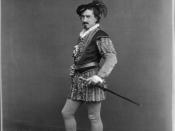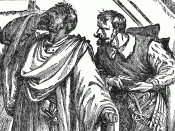Elizabeth I, a strong female leader, was on the throne at the time Shakespeare was writing the play ÃÂOthelloÃÂ. It was the 17th century and England was heading towards the end of a Renaissance, explorers were discovering new countries which lead to the rebirth of English literature, art and culture. The English language increased immensely, as new words were being added to the vocabulary. Now, at this time, the printing press took over and learning exploded; people became more literate, ideas changed and people now had access to culture, art, theatre and books. In the 17th century, it was believed that women were inferior to men. Women were perceived as creatures that lacked reason, that were ruled by their emotions and were also seen as sexual temptresses.
In this essay IÃÂm going to discuss how an audience might respond to the character of Iago. The play ÃÂOthelloÃÂ illustrates themes of sexism, racism and jealousy, which are all shown in Iago.
Iago is a soldier for the Venetian army. We first meet him in the heat of an argument with Roderigo. Our first impressions of Iago, is that he is untrustworthy and selfish. ÃÂI follow him to serve my turn upon him.ÃÂ Iago pretends to serve Othello but uses it for his own purposes. He is also revealed as two faced. ÃÂI am not what I am.ÃÂ Iago also swears by Janus, a two faced god, who he identifies with. ÃÂBy Janus, I think no.ÃÂ Janus gave January its name as itÃÂs the only month that looks forward to the New Year and looks back on the old.
Most of the play is in blank verse but when Iago speaks to Roderigo it changes into prose, to show that Roderigo is a common character. Othello uses...
![From the Library of Congress: TITLE: Thos. W. Keene. Othello CALL NUMBER: POS - TH - 1884 .O7, no. 1 (C size) [P&P] REPRODUCTION NUMBER: LC-USZC6-58 (color film copy transparency) RIGHTS INFORMATION: No known restrictions on publication. MEDIUM: 1 print (](https://s.writework.com/uploads/9/94760/library-congress-title-thos-w-keene-othello-call-number-pos-thumb.jpg)

